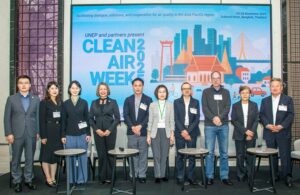Resilience and sustainability of the Congo Basin: from the past to the future
An executive summary of the 2025 assessment report (to be published in early 2026) was released at COP30 in Brazil. It presents 16 key messages and offers the first comprehensive overview of the geological, ecological and socio-economic dynamics of the Congo Basin.
Covering 3.46 million square kilometres, the Congo Basin is the ‘Green Heart’ of Africa. Its forests, savannahs, swamps, mountain ecosystems and the world’s largest tropical peatlands regulate rainfall, water cycles and climate far beyond the region. Home to more than 10,000 plant species, 400 mammals, 1,000 birds and 700 fish species, the Congo Basin is one of the richest reservoirs of biodiversity on the planet and constitutes the largest tropical carbon sink. Its peatlands alone store around 30 billion tonnes of carbon, which is essential for global climate stability.
For more than 650,000 years, humans have managed and shaped these landscapes. However, human activity since colonisation has brought industrial logging, mining, oil exploration and urban expansion. Unsustainable practices, persistent conflicts, and increasing climate risks are pushing the ecosystems and livelihoods of the Congo Basin towards critical thresholds. Despite decades of progress in forest management and conservation, sustainable development remains precarious. Experts warn that the future resilience of the Congo Basin will depend on strengthened governance, equitable and predictable financing, community-based management, adequate and long-term investment in science, and a global effort to reduce carbon emissions and combat climate change.
The Congo Basin Assessment Report 2025, entitled ‘Resilience and Sustainability of the Congo Basin: From Past to Future’, brings together leading scientists and regional experts to synthesise available knowledge and chart a sustainable path for the future. Through 39 chapters organised into four sections, the report traces the ecological and human history of the Congo Basin, documents key environmental changes, and highlights innovative solutions for sustainable development. The report describes the Congo Basin as the ‘green engine’ of the African continent, vital for supporting livelihoods, biodiversity and the climate, and proposes ways to protect natural capital while strengthening sustainable development.
It warns that continued exploitation will further erode one of the world’s most important tropical ecosystems, jeopardising regional and even continental stability, as well as global climate goals. At the same time, the Science Panel for the Congo Basin (SPCB) highlights the Congo Basin’s potential to drive nature-based development strategies in Africa, highlighting opportunities for sustainable management and optimisation of existing resources. It calls for action on reliable financing and equitable investment in the sustainable development of the Congo Basin nations, identifying urgent knowledge gaps and research priorities to guide future policy, investment and conservation efforts.
More
Science Panel for the Congo Basin (SPCB)
Launched at COP28, SPCB is the first independent scientific body dedicated to assessing the region’s ecosystems, their condition and the threats they face, in order to guide sustainable development and conservation policies. The Panel brings together more than 180 scientists and is co-chaired by Bonaventure Sonké (University of Yaoundé I, Cameroon), Lydie-Stella Koutika (Centre for Research on the Sustainability and Productivity of Industrial Plantations, Republic of Congo) and Corneille Ewango (University of Kisangani, DRC).
https://www.spcongobasin.org
Sustainable Development Solutions Network
The Sustainable Development Solutions Network (SDSN) works under the auspices of the UN Secretary-General to mobilise universities, think tanks and research centres to advance the Sustainable Development Goals (SDGs) and the Paris Agreement. Created in 2012 by former UN Secretary-General Ban Ki-moon and economist Jeffrey Sachs, SDSN promotes evidence-based solutions, policy analysis, education and global cooperation at the intersection of science, policy and practice.
https://www.unsdsn.org/
Centre de Ressources COP30 du SDSN
https://www.unsdsn.org/resources/cop-resource-hub/
Contacts






